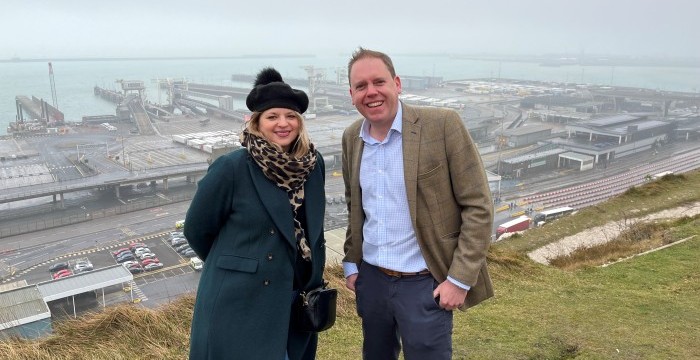In an article in the latest issue of Pig World, NPA senior policy adviser Charlie Dewhirst discusses a recent useful NPA visit to Dover.
Becca and I were lucky enough last month to visit the Port of Dover for a tour of their operations so that we could see first-hand the challenges facing our pork exporters, as well understanding what the Government is doing to prevent African swine fever (ASF) entering the UK.
The Port of Dover is a phenomenal operational undertaking and a vital strategic asset for UK trade with the EU. £144 billion of freight travels through the port every year in 7,000 lorries a day. It accounts for 33% of all UK trade with the EU and 30% of all roll-on/roll-off ferry arrivals into the country, four times more than the second busiest freight ferry port at Immingham.
These are impressive statistics for a port which is restricted to a 40-acre site nestled at the bottom of the White Cliffs with very little room for expansion.
Furthermore, the port serves tourists, cruise ships, bulk cargo like grain and sand and has been tasked by the Home Office with the incredibly difficult job of being the point of arrival for the small boats crossing the Channel.
As we stood on the top of the cliffs overlooking the port on a wet and windy morning (see photo!) with the harbour wall barely visible in the distance, it was striking how smoothly the traffic flowed on and off the ferries that depart every 30 minutes for Calais. Obviously, things can and do go wrong, as we see in the news when Operation Stack turns the M20 into a car park, but it is rare enough to make it newsworthy.
The disruption that our exporters faced when the UK officially left the EU on 1 January 2020 was thankfully short-lived, although various non-tariff costs remain which are not yet incurred by product coming the other way due to the lack of border checks on imports to the UK.
However, at some point in the next 12 months, the EU will introduce a new Entry/Exit System (EES) which has the potential to cause chaos and could once again leave our freight stuck for days waiting to cross the Channel.
It will require any individual entering the EU to register on a new biometric system which can only be done at the point of entry and not in advance. With the French border effectively being at Dover, this could mean enormous queues as every tourist and lorry driver from the UK is required to stop and have their details registered on EES.
Port of Dover and others are lobbying the Government hard to agree bespoke system for the UK with the EU to allow pre-registration and the NPA will be supporting that effort. We understand that Prime Minister Rishi Sunak will be meeting French President Emmanuel Macron in the coming weeks to discuss the subject.
Illegal pork imports
Whilst we are working hard to avert disruption to our exports, we are pressing the Government to do everything they can to disrupt the illegal importation of pork into the UK.
On the very day we were at Dover, it was announced that another seizure of pork illegally imported from Romania had taken place in Lowestoft. The pork had travelled through the Port of Dover on its way to East Anglia, probably in a vehicle that had gone through the tourist lanes on entry, rather than freight. This is how ASF is most likely to find its way into the UK.
Last September, the Government introduced new laws on non-commercial pork imports and redirected resources to ports and airports in an attempt to improve our border biosecurity, but it is clear that more needs to be done.
We have tried to get data from Defra about how much pork has been seized in recent years but, as yet, we have had no answer. It is the biggest single threat to our industry, and we will continue the fight for better protections at our borders.




